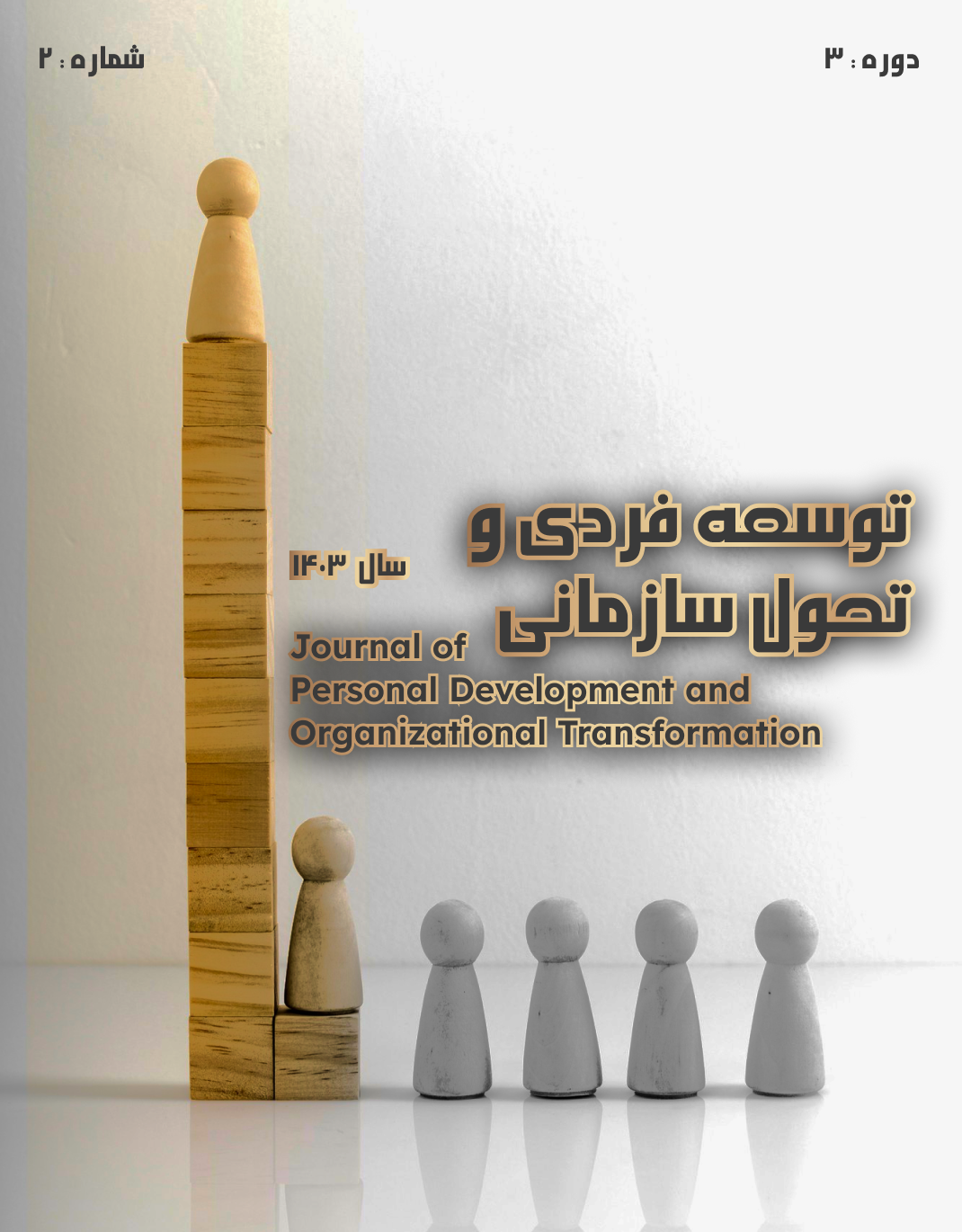Developing an Optimal Governance Model with a Resistance Economy Approach (Case Study: National Water Organization)
Keywords:
Good governance, resistance economy, National Water Organization, grounded theory, confirmatory factor analysisAbstract
This study aims to develop an optimal governance model with a resistance economy approach for the National Water Organization to enhance institutional resilience, structural efficiency, and the realization of indigenous principles of resilient governance. This research employed an exploratory mixed-methods design consisting of qualitative and quantitative phases. In the qualitative phase, using grounded theory methodology, semi-structured interviews were conducted with 15 experts in governance and water management. The data were analyzed through open, axial, and selective coding using MAXQDA software. In the quantitative phase, a descriptive-correlational design was applied. A researcher-developed questionnaire, based on qualitative findings, was distributed among 351 participants selected through stratified random sampling. The data were analyzed using confirmatory factor analysis (CFA) and structural equation modeling (SEM) via LISREL 8.8 software. The results of the second-order confirmatory factor analysis demonstrated that the measurement model had an acceptable fit, confirming the validity and significance of all seven key components: participation, accountability, transparency, justice, rule of law, responsibility, and efficiency-effectiveness. The structural model was statistically supported and theoretically sound. The proposed model offers a practical and contextually grounded framework for strengthening governance in service-oriented organizations under sanctions and economic crises, contributing to the structural resilience and policymaking efficiency of the National Water Organization.
Downloads
References
Aghababaeian, H., Khosravifar, A., & Janbazloufar, K. M. (2023). Does Monsoon Itself Cause Health Risks? Lessons From the Flash Flood of Imamzadeh Davood, Iran 2022. Disaster Medicine and Public Health Preparedness, 17. https://doi.org/10.1017/dmp.2023.104
Agheli, L., & Ezzati, M. (2019). The Study of Iran's Performance Regarding the Nine Dimensions of Resilient Economy in Comparison With Corresponding Indicators in the Selected Countries of the MENA and ECO. Quarterly Journal of The Macro and Strategic Policies, 710-729. https://doi.org/10.32598/jmsp.6.special.issue.710
Amiri, H., Beyranvandorcid, M. P., Amoginorcid, F. N., & Alizadeh, S. (2018). Estimation Vulnerability and Resilience Indicators in Iran Economy. Quarterly Journal of The Macro and Strategic Policies, 434-455. https://doi.org/10.32598/jmsp.6.3.434
Azimi, M., Sharifian, A., Riazinia, V., Arzani, H., & Abbaspour, K. C. (2022). Pastoral Community's Vulnerability Under Extreme Floodings Accelerated by Rangeland Degradation Among Turkmen Transhumant, Northern Iran. Journal of Flood Risk Management, 15(4). https://doi.org/10.1111/jfr3.12842
Batmanghelidj, E. (2021). The Ins and Outs of Iranian Industrial Resilience Under Sanctions. The Muslim World, 111(1), 96-112. https://doi.org/10.1111/muwo.12374
Citaningati, P. R., & Alfianto, T. (2024). Blue Economics in Islamic Economics Perspective: Fiqh Bi’ah Approach. Journal of Islamic Economic Laws, 7(02), 128-160. https://doi.org/10.23917/jisel.v7i02.5200
Habibi, R. (2019). The Necessity of Revising the Currency Policy: Looking at the Effect of Exchange Rate on Iran’s Trade Balance and National Production During 2001-2016. Quarterly Journal of The Macro and Strategic Policies, 750-769. https://doi.org/10.32598/jmsp.6.special.issue.750
Homayoun, S., Pazhohi, M., & Tamam, H. M. (2024). The Effect of Innovation and Information Technology on Financial Resilience. Sustainability, 16(11), 4493. https://doi.org/10.3390/su16114493
Hosseini, S., Taghvaei, M., & Ataev, Z. V. (2023). An Elaboration of Obstacles and Perspectives of Medical Tourism Development Taking the Approach of Integrated Service Provision (Case Study: Isfahan Province, Iran). South of Russia Ecology Development, 18(3), 210-225. https://doi.org/10.18470/1992-1098-2023-3-210-225
Jabbari, A., Mohammadi, F., & Heidari, L. (2020). Manifestations of Economic Resilience in Hospitals: What Do Managers Say? The Journal of Tolooebehdasht. https://doi.org/10.18502/tbj.v19i1.2814
Kalb, Z. (2024). Mobilized Resilience and Development Under Sanctions in Iran. Development and Change, 55(5), 933-964. https://doi.org/10.1111/dech.12859
Kirkham, K. (2022). The Political Economy of Sanctions: Resilience and Transformation in Russia and Iran. https://doi.org/10.1007/978-3-031-04055-9
Kozhanov, N. (2023). Between Development, Growth and Survival: Some Current Features of Iran’s Model of Socio-Economic Development. Journal of International Analytics, 14(1), 72-91. https://doi.org/10.46272/2587-8476-2023-14-1-72-91
Moussaoui, F. (2022). The Failure of Western Policies Toward Iran’s Power Projection &Amp; Resilience Strategies. Comillas Journal of International Relations(23), 13-35. https://doi.org/10.14422/cir.i23.y2022.002
Nia, S. S., Rad, H. A., Daneshnia, M., Rad, F. A., & Qezelbash, A. (2019). Resistance Economy, Fiscal and Monetary Policy and Its Impact on Economic Growth in Iran. Quarterly Journal of The Macro and Strategic Policies, 730-749. https://doi.org/10.32598/jmsp.6.special.issue.730
Nikian, A., Zare, H. K., Lotfi, M. M., & Nezhad, M. S. F. (2022). Redesign of a Sustainable and Resilient Closed-Loop Supply Chain Network Under Uncertainty and Disruption Caused by Sanctions and COVID-19. Operations Management Research, 16(2), 1019-1042. https://doi.org/10.1007/s12063-022-00330-3
Qadi, M. R., & Alavian, M. (2022). Evaluation and Evaluation of Public Policy in the Islamic Republic of Iran Based on the Theory of Good Governance. International journal of health sciences, 48550-48571. https://doi.org/10.53730/ijhs.v6ns7.13638
Rabbani, M., Yazdanparast, R., & Mobini, M. (2019). An Algorithm for Performance Evaluation of Resilience Engineering Culture Based on Graph Theory and Matrix Approach. International Journal of Systems Assurance Engineering and Management, 10(2), 228-241. https://doi.org/10.1007/s13198-019-00774-0
Rasoulinezhad, E., & Karimpour, M. (2022). Characteristics and Aspects of the Oil Revenue Management Models in Iran and the Russian Federation. Transbaikal State University Journal, 28(5), 101-109. https://doi.org/10.21209/2227-9245-2022-28-5-101-109
Sadrmomtaz, N., Khedmati, M., & Babaei, A. (2022). Evaluation of the Performance of World Countries' Health Systems in the Face of Covid-19 in Respect of Vaccination Role. Depiction of Health, 13(1), 33-47. https://doi.org/10.34172/doh.2022.03
Seyedan, N., Mohammadi, I. M., Hoseini, S. J. F., & Moghaddasi, R. (2020). Modeling Education to Develop Resistive Economics in Agricultural Economy in Iran. Plant Archives, 21(supplement 1). https://doi.org/10.51470/plantarchives.2021.v21.s1.375
Vitkovic, S., & Soleimani, D. (2019). The Economic and Social Impacts of Water Scarcity in the Ir Iran. Ijasos- International E-Journal of Advances in Social Sciences, 342-359. https://doi.org/10.18769/ijasos.531330
Wellman, R., & Jaffal, I. (2023). Commemorations and Outreach: Shi‘i Leaders of Metro Detroit Take on TheCOVID‐19 Pandemic. Journal for the Anthropology of North America, 26(1-2), 21-40. https://doi.org/10.1002/nad.12177
Zarghami, S., Kaleji, L. K., & Abhari, M. (2023). Resilience Analysis of the Local Communities From a Political Economy Perspective in Zanjan, Iran. Scientific reports, 13(1). https://doi.org/10.1038/s41598-023-46838-x
Downloads
Published
Submitted
Revised
Accepted
Issue
Section
License
Copyright (c) 2025 Alireza Eslami, Yahya Dadash Karimi, Farhad Nejad Irani (Author)

This work is licensed under a Creative Commons Attribution-NonCommercial 4.0 International License.







